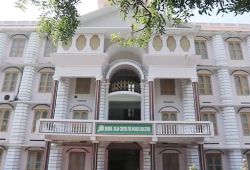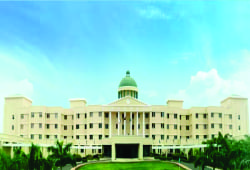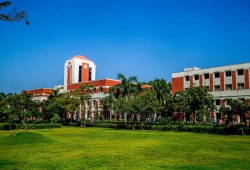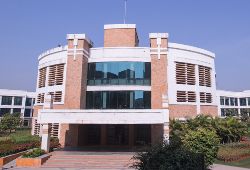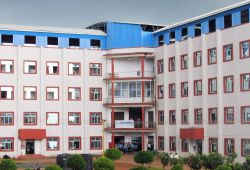Chennai is the capital of Tamil Nadu. It is the largest tenth Indian state by area and sixth largest Indian state by population and it is also the second-largest state by the economy in India. Greatest attraction of Tamil Nadu is magnificent temples, several hill stations, beaches, resorts, and wildlife, people of Tamil Nadu are very hospitable and welcome the tourist and visitors uniquely and warmly. It is one of the best places for education here you can find top Aerospace engineering colleges, top schools, institutes, etc. Tamil Nadu is the safe and secure place where students can pursue their dreams.
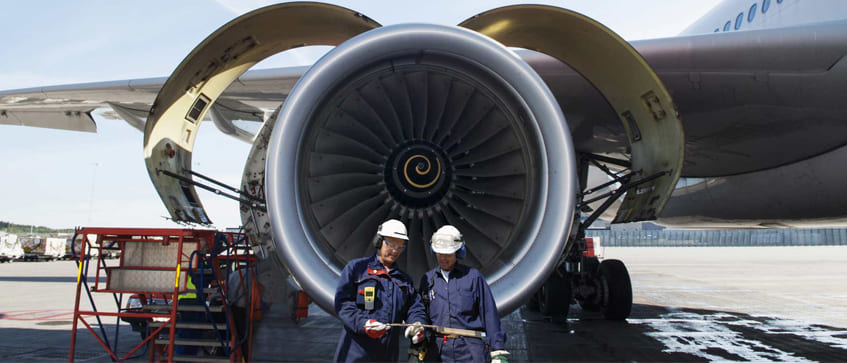
Best Aerospace Engineering Colleges in Tamilnadu
For those who aspire to achieve greater things, aerospace engineering is an exciting and dynamic field with countless opportunities. The southern Indian state of Tamil Nadu is well known for its thriving aerospace industry and strong educational system. We'll examine the best aerospace engineering colleges in Tamil Nadu in this post, emphasizing their unique qualities and the reasons prospective aerospace engineers need to think about settling in this dynamic state.
| Property | Value |
|---|---|
| Course Name | Aerospace Engineering |
| Full Form | Bachelor of Technology (B.Tech) or Bachelor of Engineering (B.E) in Aerospace Engineering |
| Streams | B.Tech/B.E Aerospace Engineering |
| Course Type | Degree |
| Course Duration | 4 Years |
| Examination Type | Semester wise |
| Eligibility | XII (PCM/PCB), 3 Years Engineering Diploma |
| Admission Process | AME CET (Aircraft Maintenance Engineering Common Entrance Test) |
| Course Fees | 5 to 10 lakhs total course fees |
| Average Salary | Starting Salary: 6 to 10 Lacs per annum |
| Top Recruiting Companies | Boeing, Airbus, Lockheed Martin, NASA, ISRO, DRDO, Bombardier, etc. |
| Top Job Profiles | Aircraft Design Engineer, Avionics Engineer, Manufacturing Engineer, Testing Engineer, Quality Control Engineer, etc. |
Why Choose Tamil Nadu for Aerospace Engineering?
Tamil Nadu is well-known for its substantial contributions to the aerospace industry in addition to its rich cultural legacy and breathtaking natural surroundings. Numerous well-known companies and research facilities focused on aerospace technology are located in the state. Tamil Nadu's allure as a center for aerospace education is further enhanced by its friendly environment, varied culture, and plentiful job opportunities.
Aerospace Engineering Colleges in Tamilnadu Fees
The type of college, the program level (undergraduate or postgraduate), and whether the college is privately owned or government-funded are some of the variables that can affect the costs of aerospace engineering colleges in Tamil Nadu. An outline of the costs associated with aerospace engineering programs in Tamil Nadu is provided below:
- Government Colleges: Aerospace engineering programs in Tamil Nadu are generally more reasonably priced at government-funded universities. For Tamil Nadu residents, the annual cost of undergraduate programs such as the B.Tech in Aerospace Engineering can range from INR 10,000 to INR 50,000. However, there might be a marginally higher cost for students from other states.
- Private Colleges: In Tamil Nadu, tuition at private aerospace engineering colleges is typically higher. The annual tuition for an aerospace engineering B.Tech program can range from INR 1,00,000 to INR 3,00,000 or higher. Depending on the institution's standing and reputation, the fees can differ greatly.
- Postgraduate Programs: The cost of a postgraduate program, such as an M.Tech in Aerospace Engineering, may be marginally more than that of undergraduate programs. The annual tuition at government colleges can vary from INR 20,000 to INR 1,00,000. For postgraduate programs, private colleges may charge INR 1,50,000 to INR 3,00,000 or more.
- Additional Costs: Students should budget for extra expenses like textbooks, living expenses, and hostel fees in addition to tuition fees. These costs can vary based on location and lifestyle.
- Scholarships and Financial Aid: Depending on their academic standing and financial need, many universities provide financial aid and scholarships to qualified students. To help with the cost of education, it is a good idea to look into and apply for such opportunities.
Campus Facilities for Aerospace Engineering in Tamilnadu
The aerospace engineering colleges in Tamilnadu provide a variety of tools to aid students in their research and coursework. Often, these facilities include:
- Modern Classrooms: Equipped with audio-visual aids to enhance the learning experience.
- Laboratories: well-equipped labs for practical studies and tests in aerospace materials, propulsion, and aerodynamics.
- Library: Large libraries with a wide range of aerospace-related books, research papers, and journals.
- Computer Labs: High-performance computing facilities for design, simulation, and research.
- Aircraft Models and Simulators: Some institutions may have aircraft models and simulators for hands-on training and experiments.
- Workshops: Engineering workshops to obtain practical experience in aircraft construction and maintenance.
- Hostel Accommodations: For students coming from outside the area, there are hostels on campus or nearby.
- Sports Facilities: Sports fields as well as relaxation and fitness centers.
- Cafeterias and Dining: There are several different food options available at the on-campus dining facilities.
- Wi-Fi Connectivity: Wi-Fi on campus for academic purposes and research.
- Student Clubs: A large number of extracurricular and aerospace engineering-related student organizations and societies.
- Career Guidance: Career counseling and placement cells are available to help students prepare for job placements.
Aerospace Engineering Colleges Syllabus in Tamil Nadu
Aerospace engineering programs in Tamil Nadu offer a comprehensive curriculum that covers various subjects throughout the four-year duration of the program. Here's an overview of the typical course syllabus:
First Year Subjects
Semester 1
- Calculus
- Physics - I
- Chemistry
- Basic Electrical Engineering
- Communication Skills
- Environmental Science and Engineering
- Physics Lab
- Basic Engineering Lab
Semester 2
- Vector Calculus and Ordinary Differential Equations
- Physics - II
- Material Science and Metallurgy
- Basic Electronic Engineering
- Engineering Graphics
- Computer Programming and Application
- Basic Electrical and Electronics Engineering Lab
- Chemistry Lab
Second Year Subjects
Semester 3
- Linear Algebra, Complex Analysis, and Fourier Series
- Engineering Thermodynamics
- Mechanics of Solids
- Fluid Mechanics
- Materials Processing Techniques
- Introduction to Economics
- Introduction to Machine Elements and Drawing
- Strength of Materials Lab
Semester 4
- Integral Transforms, PDE, and Calculus of Variations
- Aerodynamics
- Heat Transfer
- Applied Dynamics and Vibration
- Machining and Precision Manufacturing
- Introduction to Social Science and Ethics
- Metrology and Computer-Aided Inspection
- Thermal and Fluid Lab
Third Year Subjects
Semester 5
- Probability, Statistics, and Numerical Methods
- Compressible Flow
- Atmospheric Flight Mechanics
- Spaceflight Mechanics
- Theory of Elasticity
- Automatic Control
- Aerodynamics Lab
- Manufacturing Processes Lab
Semester 6
- Air-Breathing Propulsion
- Aerospace Structures
- Optimization Techniques in Engineering
- Principles of Management Systems
- Elective I
- Elective II
- Aerospace Structures Lab
- Modeling and Analysis Lab
Fourth Year Subjects
Semester 7
- Rocket Propulsion
- Aerospace Vehicle Design
- Environmental Science and Engineering
- Elective III
- Elective IV
- Flight Mechanics and Propulsion Lab
- Instrumentation and Control Systems Lab I
- Summer Internship and Training
Semester 8
- Comprehensive Viva-Voce
- Project Work
Aerospace Engineering Colleges in Tamilnadu Course Duration
In Tamil Nadu, a typical aerospace engineering B.Tech or B.E. program lasts four years. Some colleges might provide dual degree programs, five-year integrated programs, or other options. Research projects and internships that are part of the curriculum may also affect how long it takes.
Eligibility Criteria for Aerospace Engineering Colleges in Tamilnadu
In Tamil Nadu, the following are normally required to be eligible for a B.Tech or B.E. in Aerospace Engineering:
- Passing the 10+2 exam or a comparable test administered by an approved board.
- The candidate must have taken and passed the required courses in mathematics, physics, and chemistry (PCM).
- Passing institute-specific entrance exams or entrance exams like AME CET, JEE Main.
- Fulfilling the precise cutoff scores that each college has established.
Checking the particular requirements of the colleges you are interested in is crucial because eligibility requirements can differ from one to the next.
Admission Process at Aerospace Engineering Colleges in Tamilnadu
The following steps are typically included in the admissions process:
- Entrance Exam: Entrance exams such as AME CET, JEE Main or institute-specific entrance exams must be taken by candidates.
- Application: Complete the online or in-person application forms for the colleges you want to apply to.
- Counseling: Rounds for seat allocation or counseling are held for qualified applicants.
- Seat Allotment: Seats are distributed according to candidates' decisions made during counseling and their merit.
- Document Verification: Applicants must submit the required paperwork for validation.
- Fee Payment: To guarantee your spot at the college, pay the admission fees.
- Reporting to College: In order to finish the admissions process, admitted students must finally report to their respective colleges.
Aerospace Engineering Entrance Exam in Tamilnadu
In order to gain admission to aerospace engineering programs at different Tamil Nadu colleges and universities, aerospace engineering entrance exams are essential. Entrance exams are a crucial part of the admissions process for the various aerospace engineering programs offered by Tamil Nadu, a state renowned for its high standards of education. In Tamil Nadu, some of the well-known entrance exams accepted for enrollment in aerospace engineering programs are:
- Joint Entrance Examination (JEE) Main: A nationally recognized entrance exam, JEE Main assesses applicants' proficiency in mathematics, physics, and chemistry. For admission to their aerospace engineering programs, numerous esteemed engineering colleges in Tamil Nadu take into account JEE Main scores.
- Tamil Nadu Engineering Admissions (TNEA): Tamil Nadu's state-level engineering entrance exam is called the TNEA. It acts as the main entry point for the state's engineering programs, including aerospace engineering.
- University-Specific Entrance Exams: Specific entrance exams for aerospace engineering and related programs may be administered by certain Tamil Nadu universities and institutions. These tests might cover topics related to aerospace engineering and the institution's particular requirements.
- Aircraft Maintenance Engineering Common Entrance Test (AME CET): For students hoping to work as aircraft maintenance engineers or pursue careers in aviation, the AME CET is a crucial entrance exam. AME CET scores are accepted for admission to a number of Tamil Nadu institutions that offer aerospace and aviation programs.
Download Brochure for Aerospace Engineering Colleges in Tamil Nadu
You can download brochures straight from the official websites of the colleges you are interested in to obtain comprehensive information about aerospace engineering programs and colleges in Tamil Nadu. The following are the main sections that these brochures should contain:
- Program Overview: Information about the aerospace engineering program, such as the course structure, curriculum, and available specializations.
- Faculty Information: Faculty members' biographies, including their qualifications, areas of interest in research, and work history.
- Campus Facilities: Details regarding the laboratories, workshops, libraries, and other resources accessible to students studying aerospace engineering.
- Admission Procedures: Details about the application deadlines, accepted entrance exams, eligibility requirements, and admissions procedure.
- Scholarships and Financial Aid: Details on scholarships, grants, and financial assistance available to students.
- Placement Records: Information about internships, top recruiters, and prior placement records.
- Student Activities: Details about aerospace engineering-related clubs, societies, and extracurricular activities.
Specializations at Aerospace Engineering Colleges in Tamil Nadu
Tamil Nadu's aerospace engineering programs may provide a range of specializations or elective courses. Typical specializations include the following:
- Aircraft Design and Systems: Concentrating on aircraft development and design, including systems, structures, and aerodynamics.
- Astronautics and Space Technology: Investigating satellites, space exploration, and spacecraft design and operation.
- Propulsion Engineering: Focusing on engines and propulsion technology for use in spacecraft and aircraft propulsion systems
- Aerospace Materials and Manufacturing: Focusing on materials used in manufacturing and aerospace engineering.
- Aerodynamics and Flight Mechanics: Studying the mechanics of flight and aerodynamics for spacecraft and aircrafts.
- Avionics and Control Systems: Focusing on electronics, control systems, and avionics technology for spacecraft and aircrafts.
Depending on their interests and professional aspirations, students frequently have the freedom to select these specializations.
Top Recruiters for Aerospace Engineering Graduates in Tamil Nadu
Graduates of Tamil Nadu's aerospace engineering program can find employment with a variety of defense and aerospace companies in the state and throughout India. Among the best recruiters are:
- Indian Space Research Organization (ISRO): Provides opportunities in satellite technology, space research, and other fields.
- Defense Research and Development Organization (DRDO): Offers jobs related to aerospace and defense research.
- Hindustan Aeronautics Limited (HAL): A famous In india aerospace and defense firm that offers jobs in aircraft and aerospace technology.
- Tata Advanced Systems: A division of the Tata Group that specializes in security, defense, and aerospace solutions.
- Boeing: An international aerospace company with opportunities in aerospace engineering.
- Airbus: Another global aerospace leader with a presence in India.
- Mahindra Aerospace: Offers positions in the aerospace and aviation sector.
- Reliance Aerospace: Part of the Reliance Group, it has interests in aerospace and defense.
- L&T Aerospace: Part of Larsen & Toubro, it provides engineering and technology services in the aerospace sector.
- AeroVironment: A global company specializing in unmanned aircraft systems.
Aerospace Engineering Colleges Exam Dates in Tamil Nadu 2026
It's crucial to stay informed by visiting the official websites of the relevant colleges and examination authorities, as the dates of the 2026 aerospace engineering college exams in Tamil Nadu are subject to change. Important tests to watch out for include:
- JEE Main: For the most recent exam schedule and crucial dates, keep a watch on the National Testing Agency's (NTA) website.
- Institute-Specific Examinations: Colleges of aerospace engineering may require entrance exams. For information on the exam dates and application deadlines for the colleges you are interested in, visit their official websites.
For the most accurate and current information for 2026, it is necessary to check to with the appropriate authorities and institutions, as exam dates and admission schedules are subject to change from year to year.
How to Apply to Aerospace Engineering Colleges in Tamil Nadu
Use these general procedures to apply to Tamil Nadu's aerospace engineering colleges:
- Research Colleges: Investigate Tamil Nadu colleges that provide aerospace engineering programs first. Visit their official websites to learn more about the courses, instructors, campus facilities, and admissions requirements.
- Meet Eligibility Criteria: Make sure you fulfill the academic and entrance exam requirements by reviewing each college's eligibility requirements.
- Entrance Exam Registration: Register for entrance exams well in advance if the colleges you are interested in require them, such as AME CET, JEE Main or institute-specific entrance exams. Remember the dates of the exam and the application deadlines.
- Prepare Required Documents: Collect the required paperwork for the application process, such as identification documents, academic transcripts, and any other documents the colleges may ask for.
- Online Application: The majority of universities offer online application portals. Apply online by going to the colleges' official websites and filling out the application. Personal information, academic records, and entrance exam results are required.
- Application Fee: As each college specifies, pay the application fee. Make sure you finish the payment procedure and save the receipt for your records.
- Admission Process: After submitting your application, proceed with the next steps for admission, which may include counseling, document verification, and seat distribution in accordance with the procedures of the individual college.
- Scholarship Applications: Check out the scholarships offered by the colleges and send in the necessary paperwork if you qualify and are interested in financial aid or scholarships.
- Campus Visits: To get a firsthand look at the facilities and learning environment, try to visit the campuses of the colleges you are interested in, if at all possible.
- Admission Confirmation: Pay the required fees and finish any further admission requirements to guarantee your spot in the college of your choice after receiving admission offers.
To meet deadlines and gain admission to the aerospace engineering college of your choice in Tamil Nadu, you must be well-organized and begin the application process well in advance. For up-to-date and accurate admissions information, always visit the colleges' official websites.


